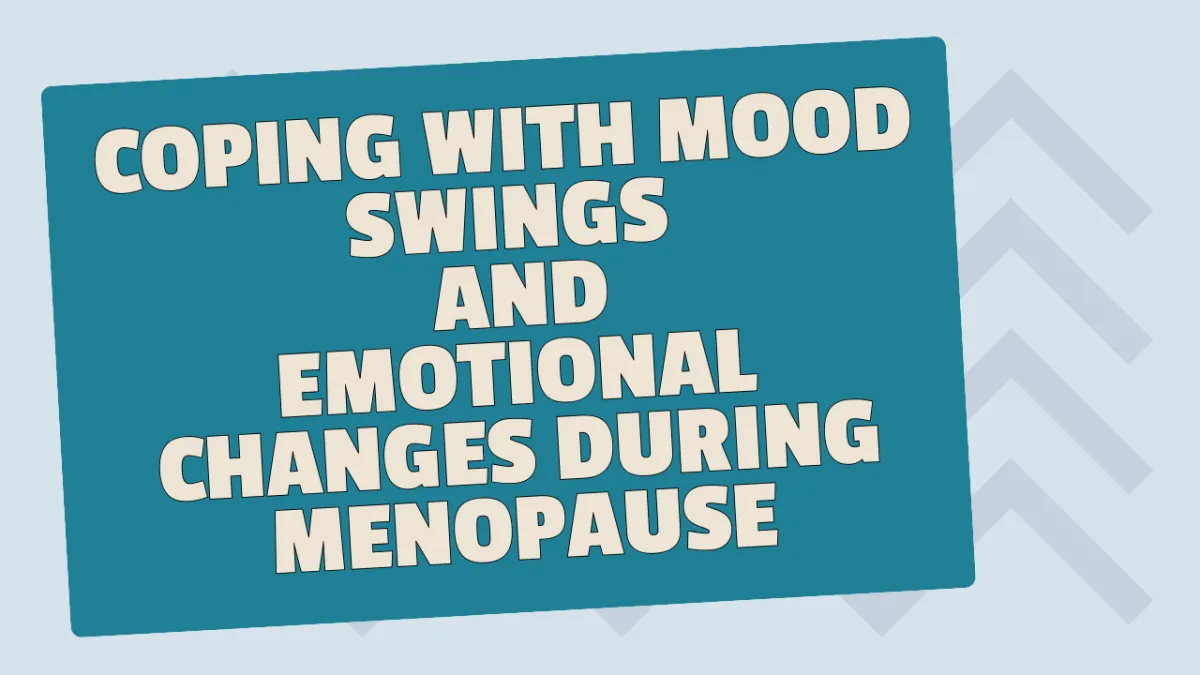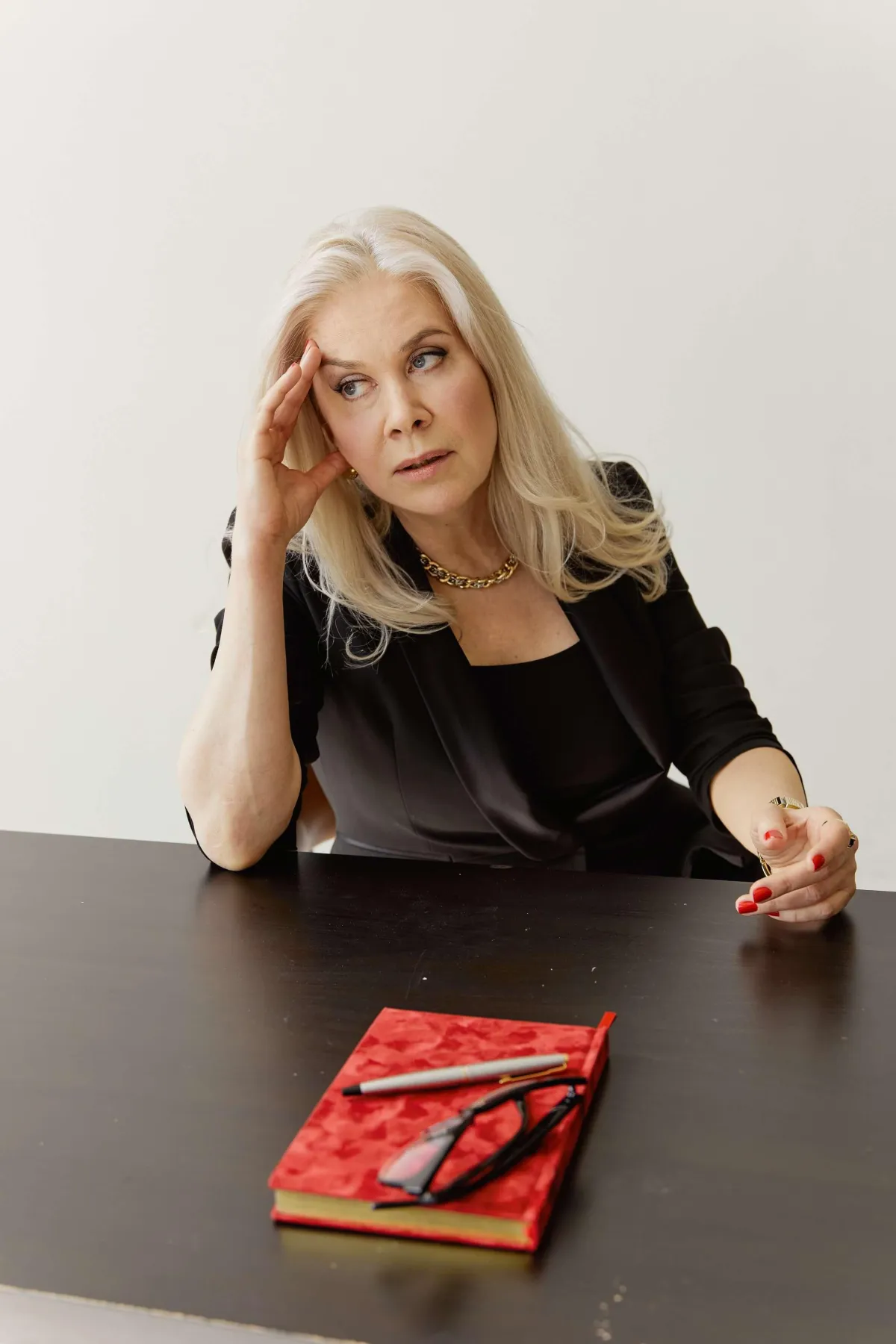Blog
Menopause Midlife & all the ****

Coping with Mood Swings and Emotional Changes during Menopause
“The trick is to age honestly and gracefully and make it look great so that everyone looks forward to it.” – Emma Thompson
Introduction:
Coping with mood swings and emotional changes during the menopause transition can be extremely challenging for some and a slight inconvenience for others. I'm Tracey Montgomery, your Menopause Strategist, here to help navigate you through the turbulent waters of midlife. Here we'll explore the normality of these emotional shifts, the hormonal fluctuations responsible for them, and most importantly, practical strategies to empower you through this transformative phase.

This page contains affiliate links. If you choose to purchase after clicking a link, I may receive a commission at no extra cost to you.
Understanding the Menopausal Rollercoaster
The menopausal transition, starting from perimenopause and on into postmenopause, brings with it a hormonal symphony that can orchestrate mood swings and emotional turbulence. It's crucial to recognise that experiencing these shifts is entirely normal and part of the profound changes your body is undergoing.
As oestrogen and progesterone, the dynamic duo of female hormones, take centre stage, their fluctuations influence your emotional landscape. Progesterone, with its calming effect on mood, sleep, and relaxation, starts to wane. Consequently, you may find yourself feeling more stressed and anxious, your self-esteem might take a hit and as we are well aware, the ability to achieve a good nights sleep may become a distant memory.
Oestrogen, plays a vital role in regulating mood-boosting hormones like serotonin, norepinephrine, and dopamine. As oestrogen levels decline, our cognitive functions such as memory and processing speed can be affected, leading to the infamous "brain fog" that many menopausal women encounter. You know the one, when you are talking to someone you know you know but cannot for the life of remember their name until hours or even days after the encounter.
Obviously this can be undermining and leave you feeling more than 'out of sorts', thereby having an effect on self-esteem and confidence.
Riding the Hormonal Waves with Empowerment
Understanding the why behind this emotional rollercoaster is the first step to empowerment and understanding.
Now, let's explore practical strategies to help you navigate these waves and find stability amidst the fluctuations.
1. Journaling: Expressing Your Inner World
Incorporating a daily journaling practice into your routine can be a game-changer. This simple yet powerful tool allows you to externalise your emotions, plan your day, and track your thoughts and feelings. Use prompts like "Today, I feel..." or "Today, I need to..." to guide your reflections. Recent studies show that routines can help with reducing stress and thereby improving self-esteem. This process not only provides clarity but also helps in releasing pent-up emotions, contributing to a sense of emotional well-being.
Journaling serves as a therapeutic outlet, a safe space to pour out your thoughts, fears, and aspirations. As you delve into this practice, you may discover patterns in your emotions, gaining valuable insights into your mental landscape. By externalising your internal dialogue, you free your mind from the weight of unspoken thoughts, offering a pathway to emotional relief.
2. Meditation: Cultivating Inner Calm
Mediation is a powerful tool used by many self-care professionals to help calm the mind and create peace. Meditation is a beacon of tranquility in the storm of menopausal changes. Just a few minutes each day can make a significant difference. Whether it's mindfulness meditation or guided sessions tailored for menopause, the practice allows your brain to switch gears, focus on positive attributes, and rationalise thoughts. Here at Menopause Midlife and all the **** we signpost you to appropriate meditations and techniques.
Meditation is not just a momentary escape; it's a transformative journey inward. As you carve out dedicated time for meditation, you grant yourself the opportunity to connect with your inner self. The stillness achieved through meditation fosters a sense of clarity and balance, serving as a counterbalance to the hormonal fluctuations that may induce emotional turbulence.
3. Nutritional Support: Nourishing Your Body and Mind
The importance of a well-balanced diet cannot be overstated. Opt for foods rich in omega-3 fatty acids, B vitamins, and antioxidants to support your overall well-being. Minimise the consumption of irritants like caffeine and alcohol, and steer clear of highly processed foods. Hydration is equally vital, even if concerns about bladder control may give pause for thought. Remember, water is the elixir that keeps your bodily functions running smoothly.
Nutrition serves as the foundation of your physical and emotional well-being. Consider this not just as a dietary adjustment but as a holistic approach to nourishing your body and mind. The nutrients you consume play a direct role in supporting your internal gut bio and thereby, influencing your mood, energy levels, and overall resilience.
4. Exercise: Energising Your Body
Despite fatigue and changes in energy levels, incorporating regular exercise into your routine remains crucial. Outdoor activities, gentle stretches, yoga, or even household chores can contribute to your overall well-being. Movement not only benefits your physical health but also has a positive impact on your mental state, helping to combat stress and anxiety.
Exercise isn't just a physical exertion; it's a celebration of what your body can achieve. As you engage in activities that bring you joy, you foster a sense of accomplishment and resilience. This isn't about conforming to external standards but embracing movement as a form of self-care, tailored to your preferences and comfort.
Crafting Supportive Routines for Emotional Resilience
The importance of routines cannot be emphasised enough. Studies show that establishing set routines can relax the brain and alleviate stress. Knowing what to expect daily or weekly provides a sense of stability amid the hormonal ebb and flow.
Combine these routines with the power of journaling, meditation, nutritional awareness, and regular exercise, and you'll find yourself equipped with a holistic toolkit to navigate the emotional terrain of menopause.
Conclusion: Embracing Your Menopausal Journey
As we wrap up this exploration, it's essential to remember that menopause is a transformative process, and the emotional shifts are integral to this evolution. By embracing supportive routines and incorporating self-mastery techniques, you're not just weathering the storm – you're thriving amidst it.
I hope these insights and strategies empower you on your menopausal journey. Remember, you're not alone.
Continuation of the Menopause Journey:
The menopause journey is a continuum. From perimenopause and on through into postmenopause, having people who understand and support you is essential. It's not the end of your life's journey; it's a life stage, and having the right community can make all the difference.
I make it my mission to support women with their transition along the menopause journey.
If you would like to join a supportive community, please drop me a line here. I love hearing from midlife women going through the menopausal transition.
Pssst, you can also check out my Menopause Midlife and all the ****. It includes monthly strategies and a community of women at the same life stage as you.
Click here to get your Menopause Morning Rituals to make every day just that little bit easier.
Oh, and come say Hi on Facebook and join the free facebook group Menopause Midlife and all the **** here.
Here's the video for those of you who prefer
For Further Reading Take A Look At This Blog:
What is The Effect of Menopause on Your Mental Health and Well-being and Why Is It Important for Women to Survive this Turbulent Life Phase?
Your Menopause Self-Mastery Checklist:
Here is a quick checklist for you to think about when taking back control and getting back on track during your menopause transition.
Embrace self-care during menopause
Develop resilience through menopause
Goal-set to thrive through menopause
Join a supportive community Menopause Midlife and all the ****
Nurture healthy relationships during menopause
Leverage emotional intelligence for menopause well-being
Self-reflect and monitor personal growth throughout your menopausal transition.

What Everyone Ought to Know About Menopause in the Workplace
07 March 2022
Menopause affects 100% of women and can have devastating effects on them, their colleagues and their workplace. Does your HR department have a Menopause in the Workplace Policy in place?

Is Your Pension Future Proof?
14 March 2022
In today's financial uncertainty have you planned for your retirement? Could you create a passive income to increase your pension pot?

Menopause Tiredness All The Time
28 March 2022
Every day my inbox is flooded with questions about menopause. People want to know why menopause causes fatigue

The Cost-of-Living Crisis and What you can do to Thrive
04 April 2022
It’s all over the news and social media, there is a rapidly developing cost of living crisis. For many there already was and has been for some time.

5 Common Symptoms of Perimenopause and Understand How to Accept Them
11 April 2022
Let’s just make it clear; 100% of women will go through perimenopause and on into menopause. 99% of women going through ‘The Change’ will experience some symptoms that can affect daily life to some degree.

Can You Start an Online Business When You're Over 50?
18 April 2022
Like most of us I didn’t always have a flexible work regime and found myself working hours for a fixed income that didn’t quite meet the lifestyle I wanted to lead.
In fact, it was not all that long ago that I had to totally reassess what I was doing and where I wanted to be.

26 April 2022
Coping With Empty Nest Syndrome as a Single Parent
As if coping with midlife, erratic hormones and perimenopause was not enough, the children who you have spent the most significant part of your life nurturing and raising are ready to leave home and spread their wings.





